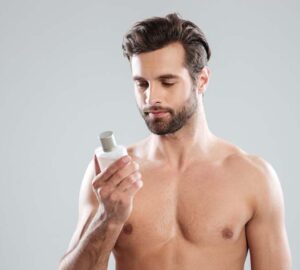Hydrogen peroxide is a household staple commonly employed for wound cleaning and disinfection. However, curiosity sometimes makes people wonder if this versatile solution can be safely used within their nasal passages. Putting peroxide in your nose raises questions about its potential benefits for sinus issues and congestion, but it also comes with concerns about safety and possible risks. In this comprehensive guide, we will explore the topic of using peroxide in your nose, examining both its potential advantages and the critical precautions you need to take to ensure your nasal health and safety.
Can You Put Peroxide In Your Nose?
While hydrogen peroxide is commonly used for wound cleaning and disinfection, it’s generally not recommended for nasal passages. The delicate nasal tissues can be sensitive to the robust solution, potentially causing irritation or damage. Moreover, improper use or excessive concentration can lead to side effects. Suppose you’re experiencing sinus issues or congestion. In that case, it’s best to consult a healthcare professional for appropriate guidance and consider safer alternatives like saline solutions or over-the-counter nasal sprays designed explicitly for nasal care. Your nasal health is essential, so always prioritize safety and expert advice regarding such practices.
Risks And Dangers Of Putting Peroxide In Your Nose
The risks and dangers of putting peroxide in your nose should not be underestimated, as the delicate nasal tissues can be susceptible to this robust solution. Here are some potential risks and dangers associated with using peroxide in your nasal passages:
Irritation Of Nasal Tissues: Hydrogen peroxide is a potent oxidizing agent, and when applied to the delicate nasal mucosa, it can cause significant irritation. This irritation can manifest as burning sensations, stinging, or discomfort within the nasal passages. It may persist for some time after application, making it an uncomfortable experience.
Damage To Nasal Membranes: The nasal passages are lined with sensitive mucous membranes that serve essential functions like filtering and humidifying the air we breathe. Hydrogen peroxide can damage these delicate membranes, potentially leading to dryness, inflammation, and bleeding. Prolonged or repeated use may compromise the overall health of the nasal passages.
Risk Of Allergic Reactions: Some individuals may be allergic to hydrogen peroxide. Applying it to the nasal passages can trigger allergic reactions, including symptoms such as sneezing, itching, nasal congestion, or even severe allergic reactions (anaphylaxis) in rare cases.
Chemical Burns: If hydrogen peroxide is not diluted correctly or if there are pre-existing issues with the nasal tissues (such as cuts or abrasions), it can cause chemical burns. These burns can result in significant pain, tissue damage, and prolonged healing times.
Sinus Infections: Using hydrogen peroxide in the nose may disrupt the natural balance of bacteria in the nasal passages. This disruption can potentially increase the risk of developing sinus infections as the protective microflora is disturbed.
Ear-Related Complications: The nasal passages and the ears are interconnected through the Eustachian tube. If hydrogen peroxide is introduced into the nasal passages and inadvertently reaches the ear canals, it can lead to discomfort, ear infections, or even damage to the eardrum.
Pre-Existing Medical Conditions: Individuals with specific medical conditions, such as nasal polyps, a deviated septum, or a history of sinus surgery, should avoid using hydrogen peroxide in the nose. These conditions can make the nasal tissues more susceptible to damage and may impede the healing process.
Improper Dilution And Application: The concentration of hydrogen peroxide used and the application method are critical factors. Improper dilution or undiluted peroxide can significantly increase the risk of adverse effects.
The Common Use Of Peroxide
Hydrogen peroxide (H2O2) is a versatile chemical compound that finds extensive use in various applications, primarily as a disinfectant and cleaning agent. Its multifunctional properties and effectiveness at killing microorganisms make it a valuable tool for various common purposes. Here’s a more in-depth exploration of the common uses of peroxide:
Wound Cleaning And Disinfection:
One of the most prevalent uses of hydrogen peroxide is in the medical field for wound care. It is applied to minor cuts, scrapes, and wounds to help clean and disinfect them. When it comes into contact with damaged tissues and organic matter, it fizzes, releasing oxygen bubbles that assist in removing debris and bacteria from the wound. The foaming action helps to lift away contaminants, aiding in the wound-healing process.
Oral Hygiene:
Hydrogen peroxide is a component of some mouthwash and toothpaste products. It is used to whiten teeth and kill harmful bacteria in the mouth. Diluted solutions can be swished as a mouthwash, but care must be taken not to swallow it, as higher concentrations can be harmful if ingested.
Hair Bleaching And Lightening:
Many people use hydrogen peroxide to bleach or lighten their hair. It can be applied to the hair to achieve highlights or a lighter shade. Hair stylists often use hydrogen peroxide-based developers in hair color products to open the hair cuticle and allow color molecules to penetrate.
Disinfecting Surfaces:
Hydrogen peroxide can be diluted and used as a practical household disinfectant. It is beneficial in kitchens and bathrooms, killing bacteria, viruses, and molds. When used in this capacity, it provides a safer alternative to some chemical disinfectants.
Contact Lens Cleaning:
Some contact lens wearers use peroxide-based solutions to clean and disinfect their lenses. These solutions provide an extra level of disinfection compared to simple saline solutions. Peroxide-based systems typically require a special case that neutralizes the peroxide after a specific period to make it safe for the eyes.
Earwax Removal:
A diluted hydrogen peroxide solution is sometimes used to soften and remove excessive earwax. It can help break down earwax, making it easier for healthcare professionals to remove blockages safely.
First Aid:
Besides wound cleaning, hydrogen peroxide can be used for specific first aid purposes. For example, in cases of accidental ingestion of certain toxic substances, medical professionals may use hydrogen peroxide to induce vomiting, but this should only be done under the guidance of a healthcare professional.
Beauty And Personal Care:
Hydrogen peroxide is a common ingredient in cosmetics and hair products due to its bleaching and antiseptic properties. It can be found in products such as hair dyes, hair sprays, and skin creams, where it plays a role in achieving desired color and skin care effects.
Pool And Hot Tub Water Treatment:
In some pool and hot tub maintenance routines, hydrogen peroxide is used as an alternative to chlorine for disinfection. It can help control algae and bacteria in the water while reducing the chemical smell often associated with chlorine-treated pools.
Plant Care:
In horticulture, particularly for hydroponic systems, hydrogen peroxide is used to oxygenate the root zone and prevent plant rot. It is typically diluted and applied to the soil or hydroponic solution to promote healthy plant growth.
The Science Behind Peroxide
The science behind hydrogen peroxide (H2O2) is fascinating, and understanding its properties and reactions is crucial for safe and effective use. Here’s an overview of the science behind peroxide:
Hydrogen peroxide has a simple chemical structure consisting of two hydrogen atoms (H) and two oxygen atoms (O) arranged as H-O-O-H. This structure features a single bond between the oxygen atoms and a peroxide bond (O-O), making it an unstable molecule. The peroxide bond is what gives hydrogen peroxide its unique properties.
Hydrogen peroxide is relatively unstable, readily breaking into water (H2O) and oxygen (O2) when exposed to heat, light, or specific catalysts. This decomposition is a spontaneous chemical reaction and is exothermic, meaning it releases heat.
One of the critical characteristics of hydrogen peroxide is its potent antimicrobial activity. This property arises from its ability to release oxygen radicals when it decomposes. These oxygen radicals, in the form of free oxygen atoms and singlet oxygen, are highly reactive and can damage the cell membranes, proteins, and DNA of microorganisms like bacteria and viruses. This makes hydrogen peroxide an effective disinfectant and antiseptic.
Hydrogen peroxide’s ability to release oxygen radicals makes it an effective bleaching and oxidizing agent. It can break down the pigments in substances like hair, fabric, and paper by oxidizing them, leading to color removal or lightening.
When hydrogen peroxide comes into contact with organic materials, such as wound debris or blood, it foams due to releasing oxygen gas during decomposition. This foaming action can help mechanically dislodge contaminants from wounds during wound cleaning.
The concentration of hydrogen peroxide significantly impacts its reactivity and safety. Common household hydrogen peroxide is typically a 3% solution, which is relatively safe for topical use. More substantial concentrations, such as those used in industrial or medical settings, can be caustic and must be handled with extreme care.
To extend shelf life and control the decomposition rate, hydrogen peroxide solutions may contain stabilizers and inhibitors. These compounds help slow down the breakdown of hydrogen peroxide when it’s exposed to light or heat. Joint stabilizers include phosphoric acid, acetanilide, and sodium stannate.
Due to its reactivity and potential for skin and eye irritation, hydrogen peroxide should be handled with care. This includes wearing appropriate protective gear, following recommended dilution guidelines, and avoiding contact with eyes and skin. Additionally, it should be stored in a cool, dark place to slow down decomposition.
When To Seeking Professional Advice?
Seeking professional advice regarding using hydrogen peroxide in specific situations is essential to ensure your safety and well-being. Here are some scenarios in which you should consider consulting a healthcare professional or expert:
- If you are considering using hydrogen peroxide in your nose or ears, it’s crucial to consult with a healthcare professional. These areas are delicate, and improper use can lead to irritation, injury, or infections.
- While hydrogen peroxide is commonly used for wound cleaning, if you have a deep or serious wound or are unsure about the appropriate treatment, seek medical advice. A healthcare professional can evaluate the wound and recommend the most suitable treatment.
- If you experience allergic reactions, such as itching, redness, swelling, hives, or difficulty breathing, after using hydrogen peroxide, stop using it immediately and seek medical attention.
- If you have chronic nasal or ear issues, such as recurring infections, polyps, or a deviated septum, consult an ear, nose, and throat (ENT) specialist before attempting hydrogen peroxide treatments.
- Extra caution is needed when using hydrogen peroxide on children or infants. Consult a pediatrician or healthcare professional for guidance on safe use, dilution, and application.
- If you are taking any medications, especially those affecting blood clotting or wound healing, consult with your healthcare provider before using hydrogen peroxide on wounds or cuts.
- If you use hydrogen peroxide for a specific condition and there is no improvement, or the problem persists, seek professional medical advice. It’s essential to address the underlying issue rather than relying solely on hydrogen peroxide.
- If hydrogen peroxide comes into contact with your eyes, rinse them immediately with copious amounts of water and seek immediate medical attention. Eye contact with concentrated hydrogen peroxide can cause severe damage.
Final Words
Hydrogen peroxide is a versatile chemical compound with many common uses, primarily as a disinfectant, wound cleaner, and bleaching agent. Understanding its properties, applications, and potential risks is essential for safe and effective use. While hydrogen peroxide has numerous benefits, it should be handled with care, especially when using it in sensitive areas like the nose, ears, or open wounds. Seek professional advice when in doubt, and always follow recommended guidelines and precautions to minimize risks and ensure your safety.
FAQ’s
Q: Is Hydrogen Peroxide Safe To Use On Wounds?
A: Hydrogen peroxide is commonly used for wound cleaning and disinfection. When appropriately used in diluted form, it can help clean wounds. However, it should only be used on deep or severe wounds with professional guidance.
Q: Can I Use Hydrogen Peroxide To Bleach My Hair?
A: Yes, hydrogen peroxide is commonly used as a hair bleach or lightener. It can be applied to the hair to achieve highlights or a lighter shade. Be cautious and follow instructions when using it on your hair to avoid damage.
Q: What Should I Do If Hydrogen Peroxide Gets In My Eyes?
A: If hydrogen peroxide comes into contact with your eyes, rinse them immediately with copious amounts of water and seek immediate medical attention. Eye contact with concentrated hydrogen peroxide can cause severe damage.




